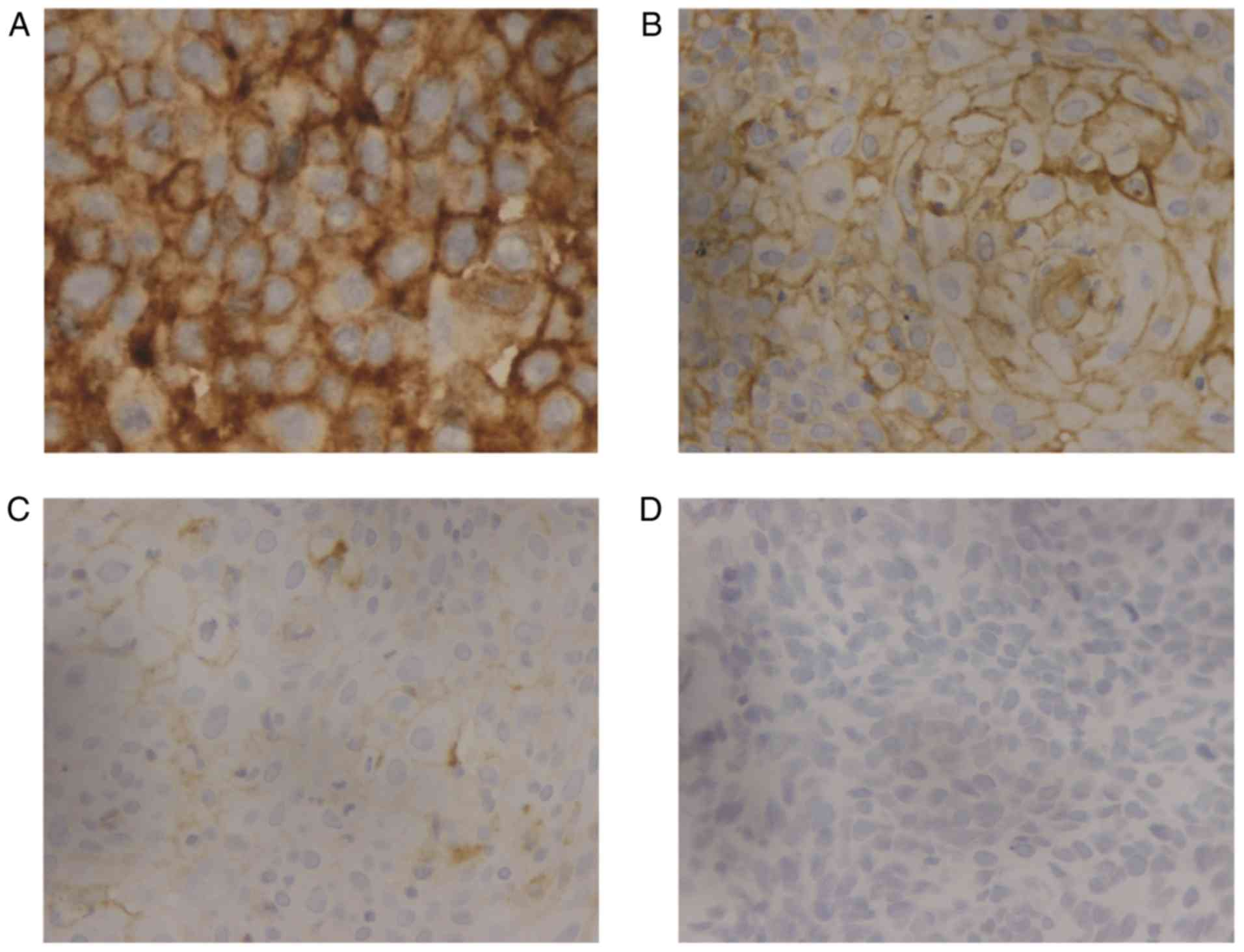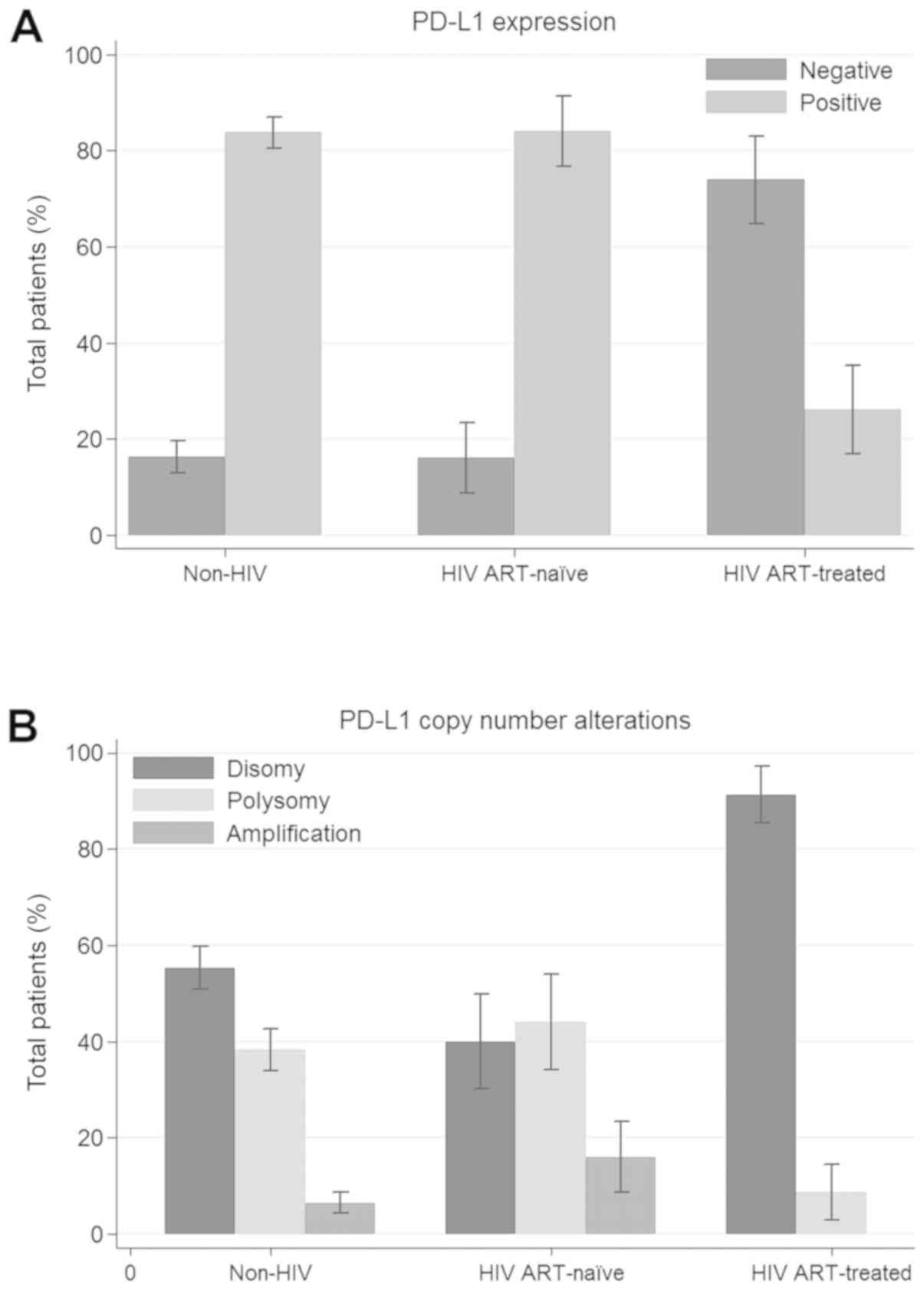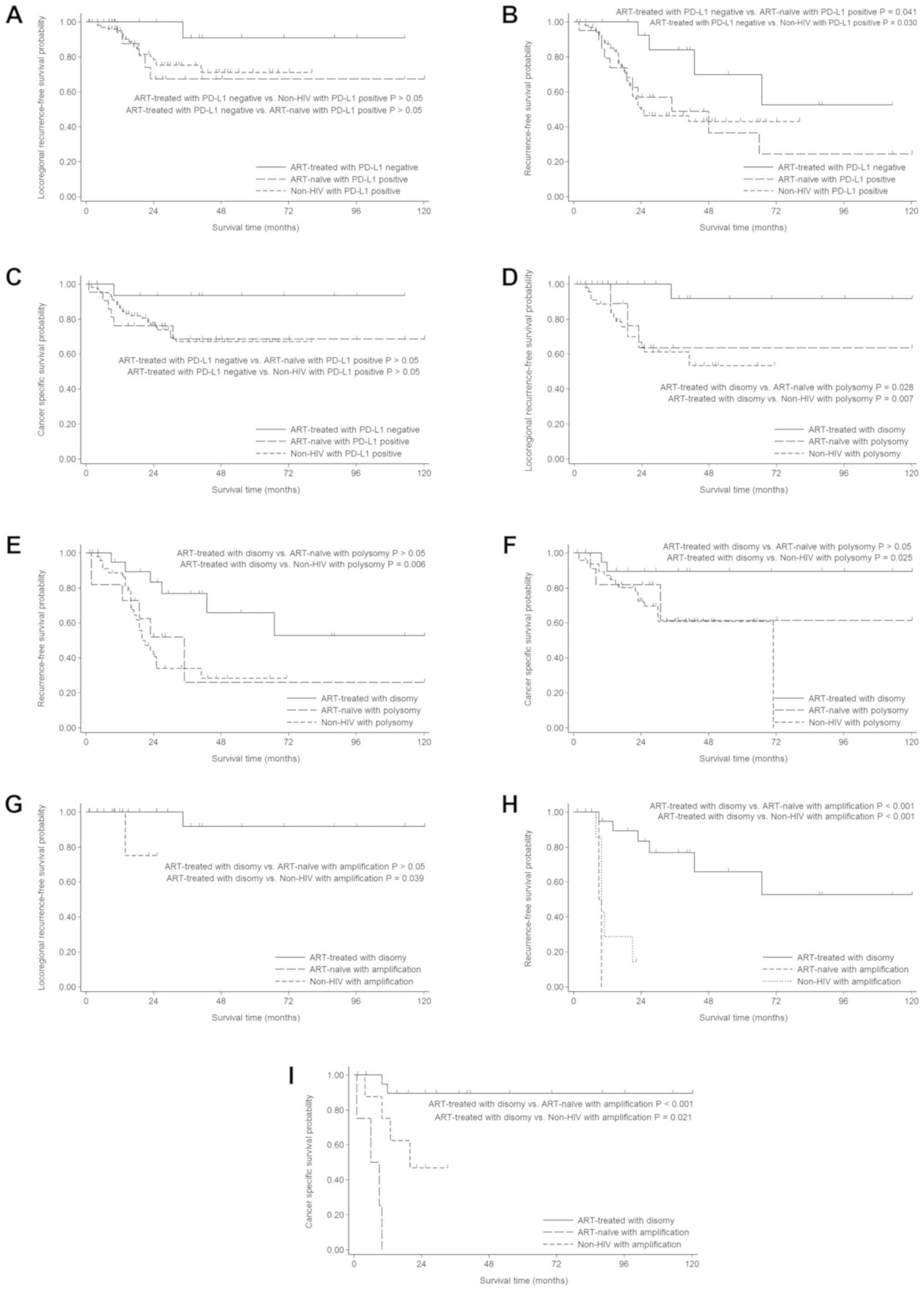|
1
|
1993 revised classification system for HIV
infection and expanded surveillance case definition for AIDS among
adolescents and adults. MMWR Recomm Rep. 41:1–19. 1992.
|
|
2
|
Indian Council of Medical Research, .
National Cancer Registry ProgrammeNational Printing Press; India:
Bangalore: pp. 60–61. 2001
|
|
3
|
Hong JH, Tsai CS, Lai CH, Chang TC, Wang
CC, Chou HH, Lee SP and Hsueh S: Recurrent squamous cell carcinoma
of cervix after definitive radiotherapy. Int J Radiat Oncol Biol
Phys. 60:249–257. 2004. View Article : Google Scholar : PubMed/NCBI
|
|
4
|
Perez CA, Grigsby PW, Camel HM, Galakatos
AE, Mutch D and Lockett MA: Irradiation alone or combined with
surgery in stage IB, IIA, and IIB carcinoma of the uterine cervix:
Update of a nonrandomized comparison. Int J Radiat Oncol Biol Phys.
31:703–716. 1995. View Article : Google Scholar : PubMed/NCBI
|
|
5
|
Greenwald RJ, Freeman GJ and Sharpe AH:
The B7 family revisited. Annu Rev Immunol. 23:515–548. 2005.
View Article : Google Scholar : PubMed/NCBI
|
|
6
|
Parsa AT, Waldron JS, Panner A, Crane CA,
Parney IF, Barry JJ, Cachola KE, Murray JC, Tihan T, Jensen MC, et
al: Loss of tumor suppressor PTEN function increases B7-H1
expression and immunoresistance in glioma. Nat Med. 13:84–88. 2007.
View Article : Google Scholar : PubMed/NCBI
|
|
7
|
Marzec M, Zhang Q, Goradia A, Raghunath
PN, Liu X, Paessler M, Wang HY, Wysocka M, Cheng M, Ruggeri BA and
Wasik MA: Oncogenic kinase NPM/ALK induces through STAT3 expression
of immunosuppressive protein CD274 (PD-L1, B7-H1). Proc Natl Acad
Sci USA. 105:20852–20857. 2008. View Article : Google Scholar : PubMed/NCBI
|
|
8
|
Taube JM, Anders RA, Young GD, Xu H,
Sharma R, McMiller TL, Chen S, Klein AP, Pardoll DM, Topalian SL
and Chen L: Colocalization of inflammatory response with B7-h1
expression in human melanocytic lesions supports an adaptive
resistance mechanism of immune escape. Sci Transl Med.
4:127ra372012. View Article : Google Scholar : PubMed/NCBI
|
|
9
|
Wu P, Wu D, Li L, Chai Y and Huang J:
PD-L1 and survival in solid tumors: A Meta-analysis. PLoS One.
10:e01314032015. View Article : Google Scholar : PubMed/NCBI
|
|
10
|
Hino R, Kabashima K, Kato Y, Yagi H,
Nakamura M, Honjo T, Okazaki T and Tokura Y: Tumor cell expression
of programmed cell death-1 ligand 1 is a prognostic factor for
malignant melanoma. Cancer. 116:1757–1766. 2010. View Article : Google Scholar : PubMed/NCBI
|
|
11
|
Velcheti V, Schalper KA, Carvajal DE,
Anagnostou VK, Syrigos KN, Sznol M, Herbst RS, Gettinger SN, Chen L
and Rimm DL: Programmed death ligand-1 expression in non-small cell
lung cancer. Lab Invest. 94:107–116. 2014. View Article : Google Scholar : PubMed/NCBI
|
|
12
|
Shi SJ, Wang LJ, Wang GD, Guo ZY, Wei M,
Meng YL, Yang AG and Wen WH: B7-H1 expression is associated with
poor prognosis in colorectal carcinoma and regulates the
proliferation and invasion of HCT116 colorectal cancer cells. PLoS
One. 8:e760122013. View Article : Google Scholar : PubMed/NCBI
|
|
13
|
Green MR, Monti S, Rodig SJ, Juszczynski
P, Currie T, O'Donnell E, Chapuy B, Takeyama K, Neuberg D, Golub
TR, et al: Integrative analysis reveals selective 9p24.1
amplification, increased PD-1 ligand expression, and further
induction via JAK2 in nodular sclerosing Hodgkin lymphoma and
primary mediastinal large B-cell lymphoma. Blood. 116:3268–3277.
2010. View Article : Google Scholar : PubMed/NCBI
|
|
14
|
Barrett MT, Anderson KS, Lenkiewicz E,
Andreozzi M, Cunliffe HE, Klassen CL, Dueck AC, McCullough AE,
Reddy SK, Ramanathan RK, et al: Genomic amplification of 9p24.1
targeting JAK2, PD-L1, and PD-L2 is enriched in high-risk triple
negative breast cancer. Oncotarget. 6:26483–26493. 2015. View Article : Google Scholar : PubMed/NCBI
|
|
15
|
Cancer Genome Atlas Research Network, .
Comprehensive molecular characterization of gastric adenocarcinoma.
Nature. 513:202–209. 2014. View Article : Google Scholar : PubMed/NCBI
|
|
16
|
Howitt BE, Sun HH, Roemer MG, Kelley A,
Chapuy B, Aviki E, Pak C, Connelly C, Gjini E, Shi Y, et al:
Genetic basis for PD-L1 expression in squamous cell carcinomas of
the cervix and vulva. JAMA Oncol. 2:518–522. 2016. View Article : Google Scholar : PubMed/NCBI
|
|
17
|
Eltom MA, Jemal A, Mbulaiteye SM, Devesa
SS and Biggar RJ: Trends in Kaposi's sarcoma and non-Hodgkin's
lymphoma incidence in the United States from 1973 through 1998. J
Natl Cancer Inst. 94:1204–1210. 2002. View Article : Google Scholar : PubMed/NCBI
|
|
18
|
Schneider E, Whitmore S, Glynn KM,
Dominguez K, Mitsch A and McKenna TM; Centers for Disease Control
Prevention (CDC), : Revised surveillance case definitions for HIV
infection among adults, adolescents, and children aged <18
months and for HIV infection and AIDS among children aged 18 months
to <13 years-United States, 2008. MMWR Recomm Rep. 57:1–12.
2008.PubMed/NCBI
|
|
19
|
Shiels MS, Pfeiffer RM, Gail MH, Hall HI,
Li J, Chaturvedi AK, Bhatia K, Uldrick TS, Yarchoan R, Goedert JJ
and Engels EA: Cancer burden in the HIV-infected population in the
United States. J Natl Cancer Inst. 103:753–762. 2011. View Article : Google Scholar : PubMed/NCBI
|
|
20
|
Kelly H, Weiss HA, Benavente Y, de Sanjose
S and Mayaud P: Association of antiretroviral therapy with
high-risk human papillomavirus, cervical intraepithelial neoplasia,
and invasive cervical cancer in women living with HIV: A systematic
review and meta-analysis. Lancet HIV. 5:e45–e58. 2018. View Article : Google Scholar : PubMed/NCBI
|
|
21
|
Chow WA, Jiang CL and Guan M: Anti-HIV
drugs for cancer therapeutics: Back to the future? Lancet Oncol.
10:61–71. 2009. View Article : Google Scholar : PubMed/NCBI
|
|
22
|
Hofmann M, Stoss O, Shi D, Buttner R, van
de Vijver M, Kim W, Ochiai A, Ruschoff J and Henkel T: Assessment
of a HER2 scoring system for gastric cancer: Results from a
validation study. Histopathology. 52:797–805. 2008. View Article : Google Scholar : PubMed/NCBI
|
|
23
|
Topalian SL, Hodi FS, Brahmer JR,
Gettinger SN, Smith DC, McDermott DF, Powderly JD, Carvajal RD,
Sosman JA, Atkins MB, et al: Safety, activity, and immune
correlates of anti-PD-1 antibody in cancer. N Engl J Med.
366:2443–2454. 2012. View Article : Google Scholar : PubMed/NCBI
|
|
24
|
Inoue Y, Yoshimura K, Mori K, Kurabe N,
Kahyo T, Mori H, Kawase A, Tanahashi M, Ogawa H, Inui N, et al:
Clinical significance of PD-L1 and PD-L2 copy number gains in
non-small-cell lung cancer. Oncotarget. 7:32113–32128. 2016.
View Article : Google Scholar : PubMed/NCBI
|
|
25
|
Dryden-Peterson S, Bvochora-Nsingo M,
Medhin H, Suneja G, Asmelash A, Pusoentsi M, Russell A, Efstathiou
J, Chabner B, Lockman S, et al: HIV infection and survival among
women with cervical cancer. J Clin Oncol. 34:3749–3757. 2016.
View Article : Google Scholar : PubMed/NCBI
|
|
26
|
Batman G, Oliver AW, Zehbe I, Richard C,
Hampson L and Hampson IN: Lopinavir up-regulates expression of the
antiviral protein ribonuclease L in human papillomavirus-positive
cervical carcinoma cells. Antivir Ther. 16:515–525. 2011.
View Article : Google Scholar : PubMed/NCBI
|
|
27
|
Xulu KR and Hosie MJ: HAART induces cell
death in a cervical cancer cell line, HCS-2: A scanning electron
microscopy study. J Microsc Ultrastruct. 5:39–48. 2017. View Article : Google Scholar : PubMed/NCBI
|
|
28
|
Tsushima F, Tanaka K, Otsuki N, Youngnak
P, Iwai H, Omura K and Azuma M: Predominant expression of B7-H1 and
its immunoregulatory roles in oral squamous cell carcinoma. Oral
Oncol. 42:268–274. 2006. View Article : Google Scholar : PubMed/NCBI
|
|
29
|
Ritprajak P and Azuma M: Intrinsic and
extrinsic control of expression of the immunoregulatory molecule
pd-l1 in epithelial cells and squamous cell carcinoma. Oral Oncol.
51:221–228. 2015. View Article : Google Scholar : PubMed/NCBI
|
|
30
|
Tudela EV, Singh MK, Lagman M, Ly J, Patel
N and Venketaraman V: Cytokine levels in plasma samples of
individual with HIV infection. Austin J Clin Immunol.
1:10032014.
|
|
31
|
De Luca A, Giancola ML, Cingolani A,
Ammassari A, Murri R and Antinori A: Circulating levels and ex vivo
production of beta-chemokines, interferon gamma, and interleukin 2
in advanced human immunodeficiency virus type 1 infection: The
effect of protease inhibitor therapy. AIDS Res Hum Retroviruses.
16:835–843. 2000. View Article : Google Scholar : PubMed/NCBI
|
|
32
|
Watanabe D, Uehira T, Yonemoto H, Bando H,
Ogawa Y, Yajima K, Taniguchi T, Kasai D, Nishida Y and Shirasaka T:
Sustained high levels of serum interferon-gamma during HIV-1
infection: A specific trend different from other cytokines. Viral
Immunol. 23:619–625. 2010. View Article : Google Scholar : PubMed/NCBI
|
|
33
|
Piconi S, Trabattoni D, Fusi ML, Milazzo
F, Dix LP, Rizzardini G, Colombo F, Bray D and Clerici M: Effect of
two different combinations of antiretrovirals (AZT + ddI and AZT +
3TC) on cytokine production and apoptosis in asymptomatic HIV
infection. Antiviral Res. 46:171–179. 2000. View Article : Google Scholar : PubMed/NCBI
|
|
34
|
Inoue Y, Matsuura S, Kurabe N, Kahyo T,
Mori H, Kawase A, Karayama M, Inui N, Funai K, Shinmura K, et al:
Clinicopathological and survival analysis of Japanese patients with
resected non-small-cell lung cancer harboring NKX2-1, SETDB1, MET,
HER2, SOX2, FGFR1, or PIK3CA gene amplification. J Thorac Oncol.
10:1590–1600. 2015. View Article : Google Scholar : PubMed/NCBI
|
|
35
|
Boulware DR, Meya DB, Bergemann TL,
Williams D, Vlasova-St Louis IA, Rhein J, Staddon J, Kambugu A,
Janoff EN and Bohjanen PR: Antiretroviral therapy down-regulates
innate antiviral response genes in patients with AIDS in
sub-saharan Africa. J Acquir Immune Defic Syndr. 55:428–438. 2010.
View Article : Google Scholar : PubMed/NCBI
|
|
36
|
Massanella M, Singhania A,
Beliakova-Bethell N, Pier R, Lada SM, White CH, Pérez-Santiago J,
Blanco J, Richman DD, Little SJ and Woelk CH: Differential gene
expression in HIV-infected individuals following ART. Antiviral
Res. 100:420–428. 2013. View Article : Google Scholar : PubMed/NCBI
|
|
37
|
Maggiorella L, Wen B, Frascogna V, Opolon
P, Bourhis J and Deutsch E: Combined radiation sensitizing and
anti-angiogenic effects of ionizing radiation and the protease
inhibitor ritonavir in a head and neck carcinoma model. Anticancer
Res. 25:4357–4362. 2005.PubMed/NCBI
|
|
38
|
Ulrike K, Markus H, Thomas H, Ellen H,
Barbara S, Rainer F and Distel LV: NNRTI-based antiretroviral
therapy may increase risk of radiation induced side effects in
HIV-1-infected patients. Radiother Oncol. 116:323–330. 2015.
View Article : Google Scholar : PubMed/NCBI
|
|
39
|
Borcoman E and Le Tourneau C:
Pembrolizumab in cervical cancer: Latest evidence and clinical
usefulness. Ther Adv Med Oncol. 9:431–439. 2017. View Article : Google Scholar : PubMed/NCBI
|


















